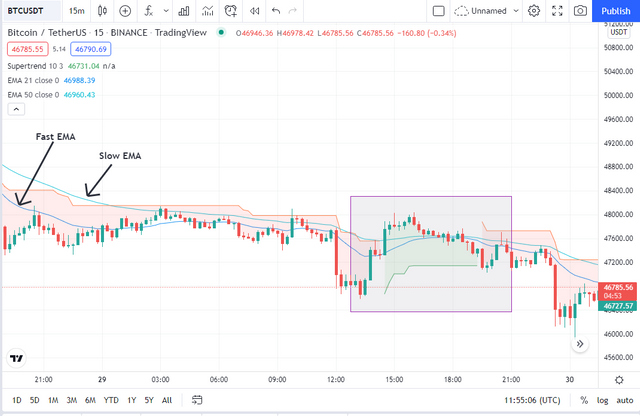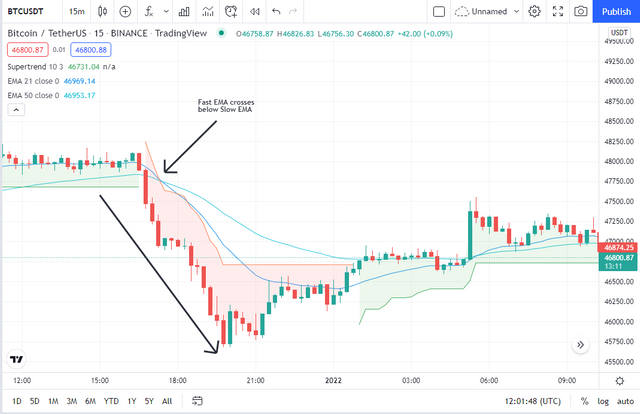Yesterday I go through the lecture taught by our respected professor @kouba01 which is all about crypto trading with SuperTrend Indicator and here is my homework post in this regard, so let's begin with it without wasting much time;
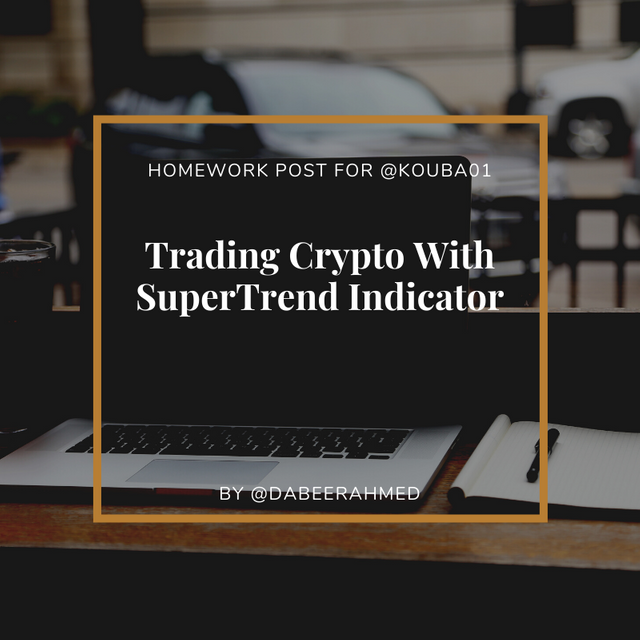

1. Show your understanding of the SuperTrend as a trading indicator and how it is calculated?

SuperTrend Indicator
As a retail trader, it is best to trade in the direction of the trend. Trading according to the trend provides insight into the market's current situation. There are numerous technical analysis tools available to help determine market trends. The SuperTrend indicator is a trend-based indicator that assists in identifying current market trends.
SuperTrend is a trend-following indicator. Traders can use the SuperTrend Indicator to detect market trends as well as buy and sell signals. Indicators are generated using mathematical models of price data points. The SuperTrend is no exception, as it is calculated by averaging the candlestick values. In addition, the indicator computes price volatility by including the Average True Range (ATR) into its computation.
The Supertrend indicator provides buy and sell signals to traders with various trend directions, which are represented by the indicator's green and red colors. When the price falls below the Supertrend indication, the indicator turns red, indicating a downtrend. Similarly, when the price is above the indicator, it signals a bullish trend and the indicator colour is green. In the absence of a trending market, the indicator appears flat, indicating that prices are ranging. When the price is in an uptrend, the supertrend indicator acts as support, and when the price is in a downtrend, it acts as resistance.
The period (ATR length) and the multiplier (factor) are sensitive aspects of the indicator that when it altered or changed, affect the indicator's performance and signal. The period (ATR length) specifies the length of the period taken in to consideration. The longer the duration, the more accurate the indicator's signal. In addition, the factor acts as a multiplier.
The default option for ATR length is 10, and the default value for factor is 3. Although these settings are not the most efficient, they can be adjusted to suit a trader's preferences. The ATR is a crucial element of the Supertrend indicator because it is used to measure both the indication value and price volatility.
How To Calculate SuperTrend Indicator
Indicators are generated using computational equations of price data points. The period and factor of the SuperTrend indication are the base parameters of the SuperTrend indicator. The SuperTrend Downtrend and Uptrend are calculated using this.
Calculation of Uptrend = (High + Low)/ 2 + factor(multiplier) * Period (ATR )
Calculation of Downtrend = (High + Low) / 2 - factor(multiplier) * Period (ATR )
It is also worth noting that adding a multiple of the volatility determines the uptrend. The volatility of the indicator is evaluated here by using the ATR (Average True Range). The Downtrend is determined by subtracting a multiple of the volatility. The volatility of the indicator is evaluated here by using the ATR (Average True Range).
The Supertrend indicator signal is calculated using the ATR indicator and is based on price volatility. The ATR can be calculated using the following parameters. First, we compute the True range, which is obtained by choosing the highest of the following equations:
First True Range = Current High - Current Low
Second True Range = Current High - Prior Close
Third True Range = Current Low - Prior Close
The ATR is then computed by taking the simple moving average of the True range over a period of 10 (default period). Using the mathematical equation below, this is stated as follows.
ATR = maximum [True range] / 14.
The above formula is used to compute the initial ATR over the specified period. The current ATR is determined using the following formula:
Current ATR = [(Previous ATR * (n-1) + Current TR) / n;
Where n = no of candles.
This calculation is performed for the current candle, which assists the SuperTrend indicator in determining and following the market trend.

2. What are the main parameters of the Supertrend indicator and How to configure them and is it advisable to change its default settings? (Screenshot required)

The Supertrend indicator's primary parameters are the ATR period and the ATR multiplier or factor. After adding the indicator to the chart, we will need to click on the Settings option to modify it.
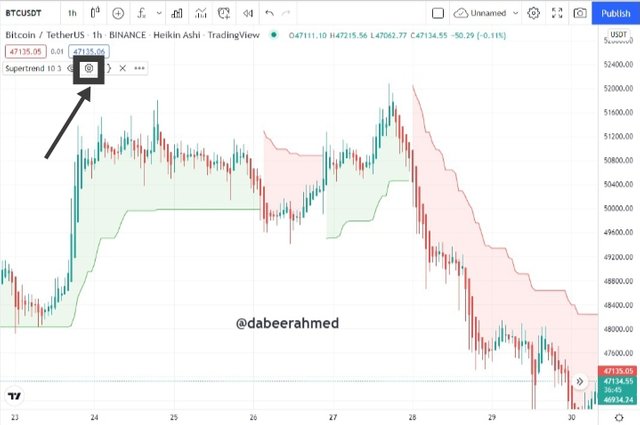
The parameters in question can be found under the input tab.
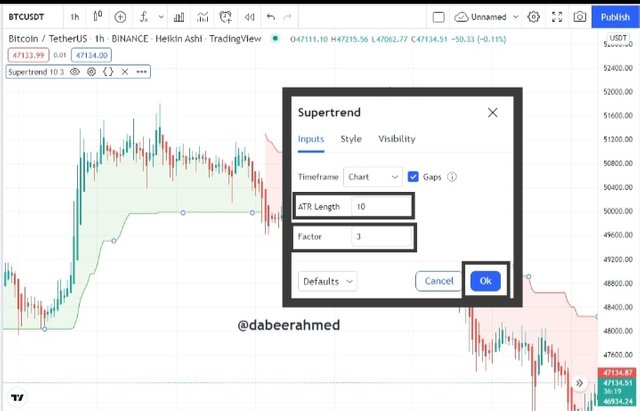
The default settings for these parameters are 10 for period and 3 for multiplier. In the chart below, we can see how they combine to generate the indicator.
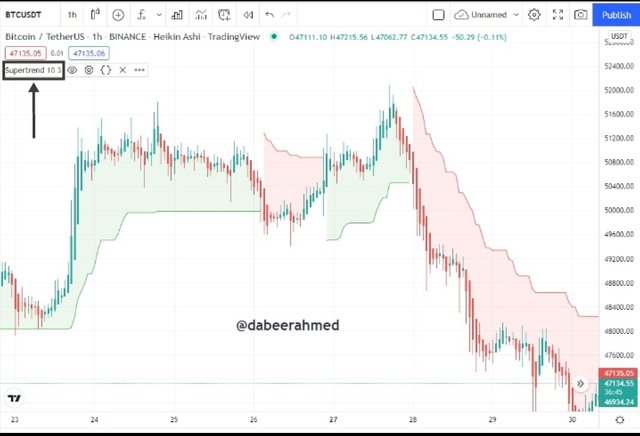
To answer the questions above, the screenshot above would be used as a reference. Now I'll experiment with the period and multiplier values to see how they alter the indicator.
ATR Period
I'll experiment with changing the ATR period to 5 and 10 to see what happens;
In the first screenshot, I set the ATR period to 5, and in the second, I set it to 15. According to my findings, the indicator with a period of 5 had more peaks and a few late signals. The indicator, on the other hand, was flatter and featured a few early indications with a longer duration of 15. Aside from that, there weren't many differences.
ATR Multiplier
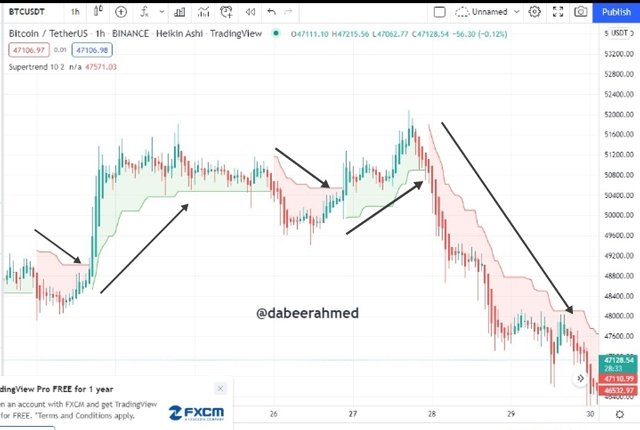
The ATR Multiplier is set to 2 in the figure above. This level increases the indicator's sensitivity to market volatility. This causes it to generate more indications even during short-term retracements. This lower level would be ideal for scalpers or other short-term traders who require quick indications. This form of configuration, however, is more prone to misleading signals.
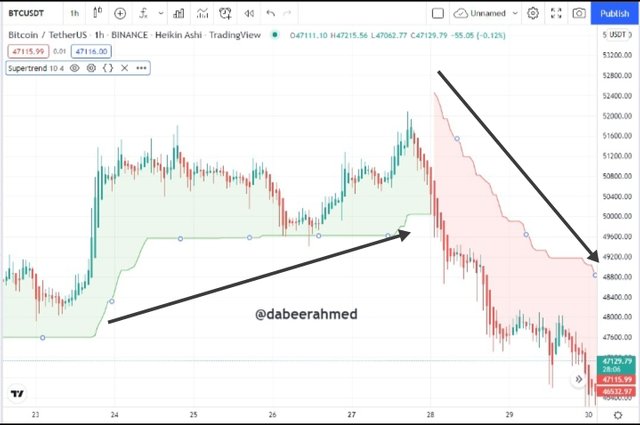
The Multiplier is set to 4 in the figure above. This level reduces the indicator's sensitivity to market volatility, resulting in fewer indications. Although it produces fewer signals, it is less vulnerable to false signals since it filters noise during retracements.
Finally, the indicator should be customised to the user's preferences and trading approach. However, before using any particular configuration, traders should backtest their technique and experiment with it before entering the market.

3. Based on the use of the SuperTend indicator, how can one predict whether the trend will be bullish or bearish (screenshot required)

Identifying Trend Using SuperTrend Indicator
The SuperTrend indication is a powerful trend following indicator that traders may use to ride large trends without being tricked by minimal price volatility. Other indicators are sensitive to minor price fluctuations, resulting in inconsistent signals about the current trend. Meanwhile, due to its adjustable coefficient value, the SuperTrend indicator does not change with low price volatility.
Depending on the current market trend, the indicator lights red or green. During a strong bullish trend, a green SuperTrend indicator appears below the price. Similarly, during a strong downtrend, a red SuperTrend indicator appears tends the to be above price. The SuperTrend indicator generates a trend identification signal by flipping the indicator colour and positioning the indicator above and below the price. In the absence of a trend (rising market), we tend to see the indicator flat, indicating a lack of market momentum. The charts below provide examples of bullish trend and bearish trend using SuperTrend indicator.

4. Explain how the Supertrend indicator is also used to understand sell / buy signals, by analyzing its different movements.(screenshot required)

A trader can perform incredible things with the Supertrend indicator. Traders can use the Supertrend indicator to identify buy and sell signals in addition to identifying market trends. This will provide them with an exact timing to enter the market.
The Supertrend's position and color are utilized to determine market indications as well as spot buy and sell signals. Traders can also use the Suptrend indicator to determine exit positions. This can be accomplished by changing the position and color of the indicator. If the indicator becomes red during a bullish position and the price falls below the Supertrend indicator, this can act as an exit signal to close the buy positions.
When the price passes above the Supertrend indicator in green, it indicates a buy signal position. This indicates a positive trend and a good time to buy for traders. Similarly, when the price crosses below the Supertrend indicator in red, it indicates bearish trend and a selling opportunity for traders.

5. How can we determine breakout points using Supertrend and Donchian Channel indicators? Explain this based on a clear examples. (Screenshot required))

Aside from spotting trends and providing buy and sell signals, the SuperTrend indicator can also be utilised by breakout traders to capitalise on market price breakouts. The Supertrend indicator is linked with another trading tool, in this example the Donchain Channels, to be used for breakouts. The Donchain channels generated a lower and upper band that represents the price highs and lows across N periods. The highs and lows for the last four weeks are generated by default during a four-week period.
Price breakouts can be spotted when the Donchain channels are paired with the Supertrend indicator. In this scenario, the Supertrend indicator serves as a trend indication, while the breakout is visible from the Donchain channels.
To confirm a bullish breakout, price must be trading above the Supertrend signal with a green color. A bullish trade can be placed when at least two candlesticks break out of the Donchain channel upper band. This is depicted in the graph below.
Similarly, for a bearish breakout utilizing Supertrend and Donchain Channel, price must break the Donchain's bottom band with at least two candlesticks. In this scenario, the Supertrend indicator is shown above the price, with a red color suggesting a bearish trend. The chart below provides an example.

6. Do you see the effectiveness of combining two SuperTrend indicators (fast and slow) in crypto trading? Explain this based on a clear example. (Screenshot required)

Yes, I believe that trading two supertrends would be highly effective. To show this, I'll use two separate supertrends with parameters of 10,3 (slow) and 21,2 (quick), as specified in the course.
Through crosses and their placement, these two indicators generate and confirm signals. I'll show you an example for each of the two market circumstances.
Buy signal using two Supertrend indicators
To get a buy signal using this approach, we would generally wait for the fast supertrend to cross the slow supertrend higher and both to be green. The two indications would now provide price support during the run. When the fast supertrend turns red, we close the position.
Sell signal using two Supertrend indicators
The steps for a sell signal are the inverse of those for a buy signal. In this situation, we'd wait for the fast supertrend to cross the slow supertrend downward, at which point both would be red. During the run, the two indicators would now act as resistance to the price. When the fast supertrend turns green, we close the position.

7. Is there a need to pair another indicator to make this indicator work better as a filter and help get rid of false signals? Use a graphic to support your answer. (screenshot required)

Technical indicators should not be employed as a stand-alone trading strategy. The reason for this is that indicators are not always accurate and can produce erroneous indications when utilised alone. Combining indicators with other trading tools or indicators helps to filter out false signals while also strengthening the signal of the indicators. As a result, I'll be merging the SuperTrend indicator with the Two Exponential Moving Average (EMA).
The EMA is a trend-following indicator that can be used to determine market buy and sell signals. I'm going to combine a slow EMA (50 period) with a quick EMA ( 21 period). This will be used to filter out misleading SuperTrend indicatior signals.
A buy signal is indicated by the fast EMA crossing above the slow EMA, while a sell signal is indicated by the fast EMA crossing below the slow EMA.
Looking at the chart above, we can see that the Super Trend indicator gave a false signal, resulting in a loss. In this case, the SuperTrend indicator indicated a buy signal because the price was trading above it, and the price also turned green. However, if we look at the EMA, we can see that the fast EMA has not yet fully crossed above the slow EMA. The EMA may be seen to have assisted in filtering out the misleading signal from the SuperTrend indicator.
Looking at the chart above, we can see how we can use the EMA to improve the signal from the ST indicator. The graph shows how the EMA helped to confirm the sell signal from the SuperTrend indicator. Price has shifted from a bullish to a bearish trend as it breaks and trades below the red Super Trend signal. After that, the sell signal from the SuperTrend can be confirmed because the slow EMA crossed below the fast EMA, indicating a bearish signal.

8. List the advantages and disadvantages of the Supertrend indicator.

Pros Of SuperTrend Indicator
- The indicator is straightforward to understand. It is not complicated because it uses only a single line, similar to moving average.
- Subject to customization and user experience, the indicator can be utilized on any timescale.
- Traders can take advantage of market trends with the help of ST and make a lot of money.
- When paired with other technical analysis tools, the SuperTrend indication signal performs better and provides more reliable signal information.
Cons Of SuperTrend Indicator
- The Supertrend indicator generates indications a little late, resulting in lesser profits.
- It generates a lot of misleading signals, especially on shorter time periods.
- In range markets, the SuperTrend indicator is ineffective. It is flexible in trendy market.
- The indicator cannot be used in standalone as a trading strategy. It is most effective when used in conjunction with other technical analysis tools to filter its signal. As a result, the indicator is less dependable.

Conclusion
The Supertrend indicator is a trend detecting indicator based on ATR that provides a reasonable grasp of market direction and forecasts future movement. The Supertrend indicator is a trend-following indicator that may be used to determine market direction as well as buy and sell trading recommendations. When used in conjunction with other indicators and price movement, it provides a reasonable comprehension of the market and generates credible signals.

Note : All the screenshots of charts are taken from Tradingview
Regards, @dabeerahmed










